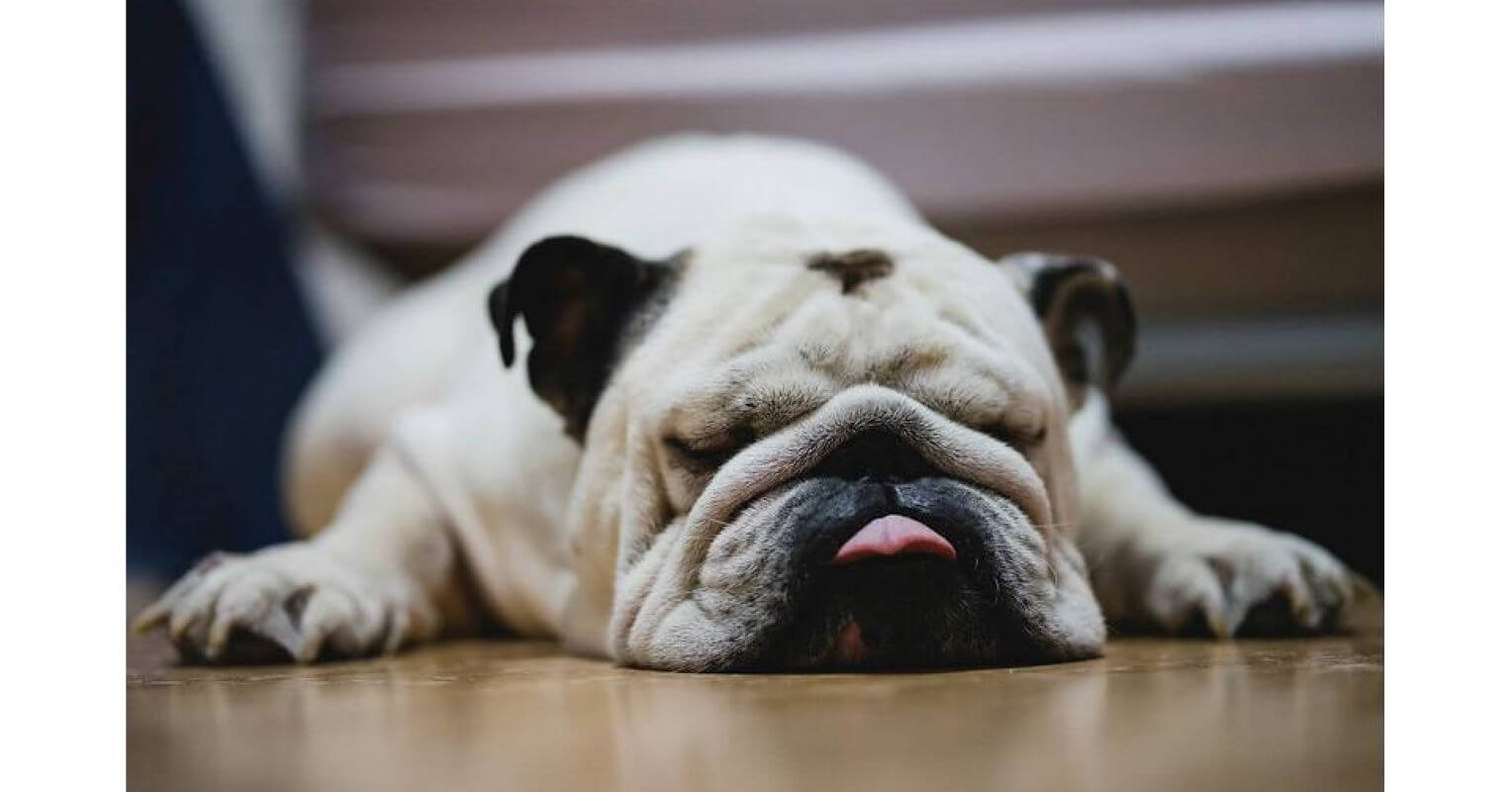Yes, dogs can snore. Just like humans, dogs can snore due to a variety of reasons including obesity, sleeping positions, upper respiratory infections, allergies, and age among other factors.
However, some breeds also have certain characteristics that predispose them to snore more than other breeds.
For instance, the shape of their head or throat can make certain breeds snore more often or even more loudly than other breeds.
Brachycephalic breeds, for instance, are more predisposed to snoring because they suffer from Brachycephalic Obstruction Airway Syndrome (BOAS), which simply implies that their breathing patterns are compromised due to their short noses and skulls.
There are also dogs that have obstructed or narrow nasal cavities or throats—and this may be present in any dog breed and not just brachycephalic breeds.
To help you understand why your dog may be predisposed to snoring, we’ll highlight some of the breeds that are known to snore
To help you understand where your dog falls as far as being predisposed to snoring is concerned, let’s have a look at some of the breeds that are known for snoring because of their physical characteristics.
1. English Mastiff
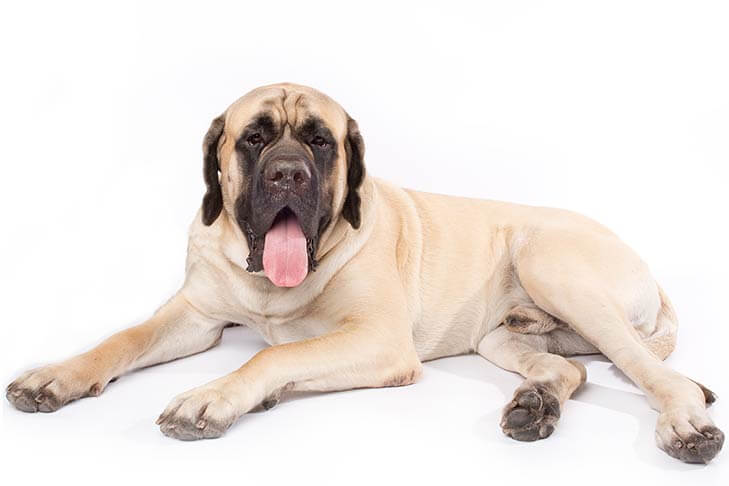
English Mastiffs are known for their large, heavy head and strong, muscular neck.
They have a broad, square-shaped head with a short, blunt muzzle and a large, black nose.
The neck is thick and well-muscled, and the throat area is relatively narrow compared to the rest of the head.
They also have a long and soft palate although it may differ in certain dogs.
These physical characteristics can contribute to the likelihood of snoring in English Mastiffs, as the narrow throat and large head and neck can cause the airway to become partially blocked during sleep, leading to snoring.
However, other factors, such as obesity, age, and the presence of abnormalities in the respiratory system, can also play a role in snoring.
2. Basset Hound
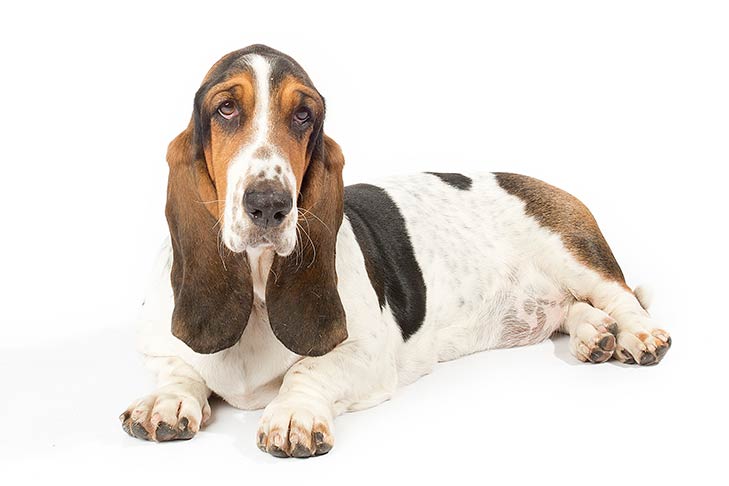
Basset Hounds are known for their long, low-slung body, large, heavy heads, and long, drooping ears.
They have a long, narrow head with a deep, wide skull and a long, narrow muzzle.
The neck is thick and muscular, and the throat area is relatively narrow compared to the rest of the head.
These physical features make the breed snore like no tomorrow.
If you have never owned a basset before, you may get alarmed at how loud they get.
There is always the off chance that snoring may be an indication of a health complication like a respiratory problem, but that is very unlikely.
As long you do not see any other signs of disease, you can safely infer that your basset’s snoring is normal and nothing to worry about.
3. Boston Terrier
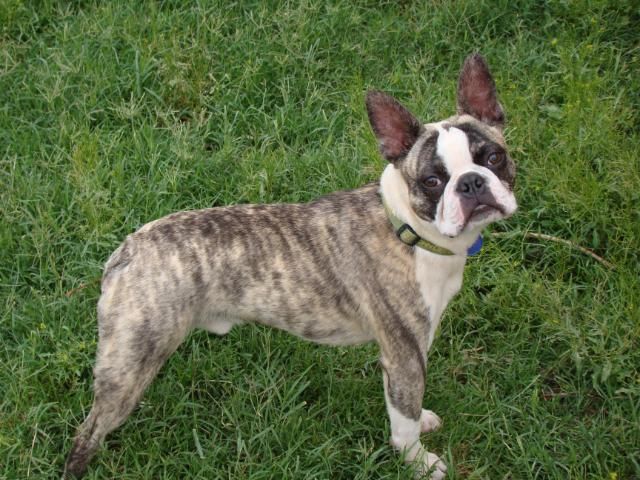
Boston Terriers are a small breed with a distinctive head shape.
They have a short, square-shaped head with a short, wide muzzle and a broad, flat forehead.
In addition to their short faces, Boston terriers have abridged muzzles which can interfere with their breathing, especially when asleep and this is what causes snoring.
In some cases, your dog may have more of a grunt than a snore which is a guttural voice that is a little lower in volume than a snore.
Wheezing sounds are also quite common in Boston terriers as well as all other small dog breeds.
Boston Terriers are also known to snort a lot as a consequence of their pharyngeal gag reflex (reverse sneezing).
4. Boxer
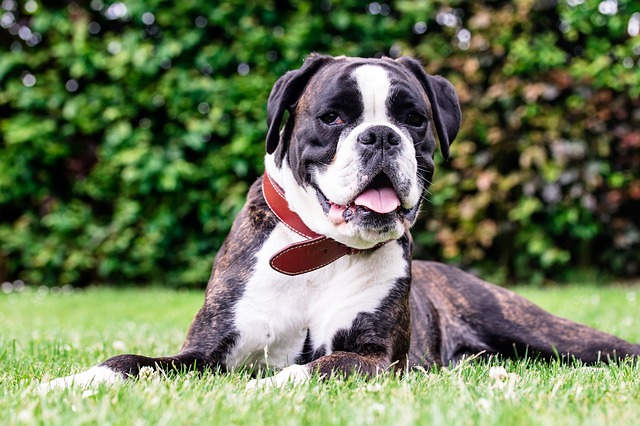
Boxer is a breed of dog that is considered brachycephalic, which means that it has a short, broad head and a shortened upper jaw.
Brachycephalic breeds are prone to certain health issues related to their facial structure, such as breathing difficulties and overheating.
Boxers have an elongated soft palate and they also have narrow nostrils (stenotic nares).
Boxers also have a hypoplastic trachea. This is where the trachea is encircled with rings of cartilage that has abnormal growth thereby resulting in a narrower than-usual trachea.
As if not enough, they also have everted laryngeal saccule which is a tissue that is found close to the vocal codes.
This tissue is occasionally pulled into the windpipe thereby causing an obstruction.
All these factors put together make boxers snore when in sleep.
5. Bulldog
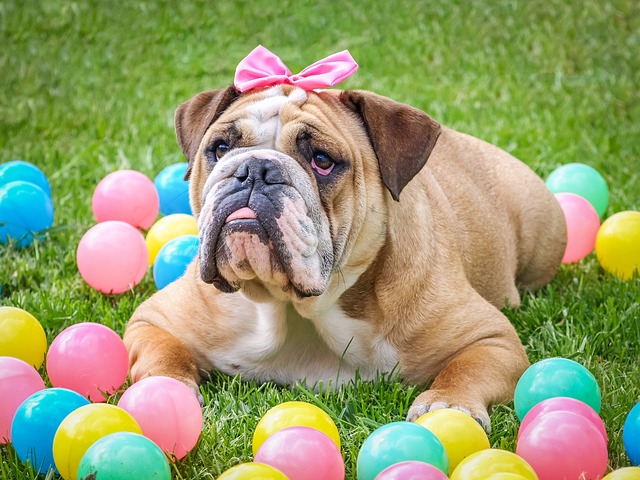
The head of a bulldog is large and square-shaped, with a short muzzle and wrinkles on the face.
The head is proportionate to the rest of the body and is characterized by a strong, muscular jaw.
The nose is usually black and may have a slight downward curve.
It is also very common for bulldogs to have constricted airways as a result of lots of fatty deposits that they have in their throats.
Additionally, bulldogs have long and soft palates as well as long tongues which can impede a smooth flow of air when breathing. This is the main reason why bulldogs tend to snore.
6. Burmese Mountain Dog
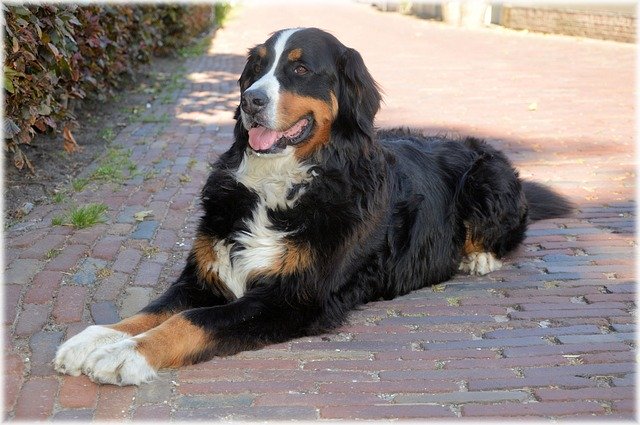
Burmese mountain dogs are known for their large, triangular head with strong muzzles and broad, powerful jaws.
Their head is proportional to the size of the dog and is wider at the ears than at the eyes.
They have ears that are set high on the head and are triangular, with a pointed tip.
Burmese dogs also have large and black wide nostrils but they have a constricted airway which makes it hard for air to pass through while breathing and this is why they snore in their sleep.
7. Pekingese
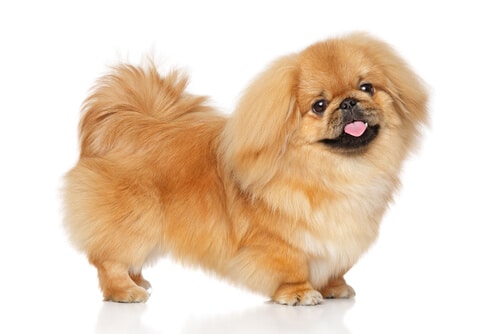
Pekingese dogs can snore or have breathing complications for a variety of reasons.
One common cause is their short, flat faces, which can cause airway obstructions and make it difficult for them to breathe.
This condition, known as brachycephalic airway syndrome, is common in dogs with short, snub noses and can be exacerbated by factors such as obesity and high ambient temperatures.
Other potential causes of snoring in Pekingese dogs include respiratory infections, allergies, and heart problems.
8. Chow Chow
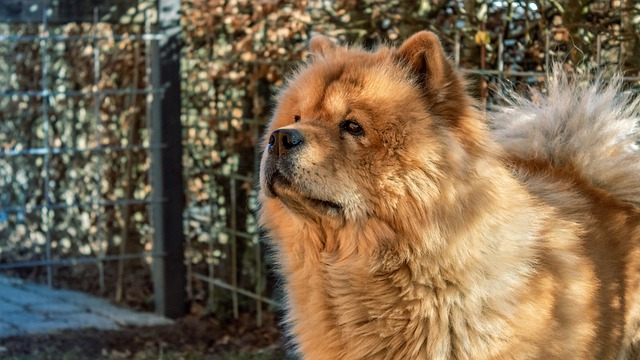
The Chow Chow dog breed is approximately 3,000 years old and it originated in China. As a consequence, this breed is well adapted to cold climates.
These dogs pant loudly when they heat up and this might be one of the explanations why they snore.
In addition, Chow Chows are brachycephalic and their scrunched-up faces predispose them to breathing problems which makes them snore in their sleep.
Also, this breed is known to be predisposed to heart conditions like pulmonic stenosis.
These heart conditions will cause a constriction of the pulmonary artery which will have lots of side effects including fainting, fluid retention, and difficulty in breathing.
If your Chow Chow has difficulty in breathing as a result of the heart issue, she will most likely snore in her sleep.
9. Pug
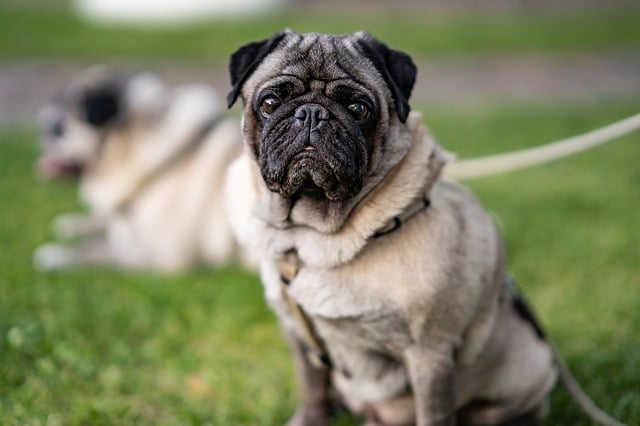
It is almost impossible to get a pug that doesn’t snore—which is not abnormal for small dog breeds that have similar head structures.
The short noses and wide nostrils of these dogs are what cause partial obstructions in the airways, which can lead to snoring during sleep.
The shape of a pug’s head is due to the breed’s brachycephalic (short-muzzled) skull structure.
This type of skull structure is characterized by a broad, shortened head with a wide, flat nose.
While this distinctive appearance is part of what makes pugs so unique and endearing, it can also contribute to certain health issues, such as breathing problems and eye problems.
10. Shih Tzu
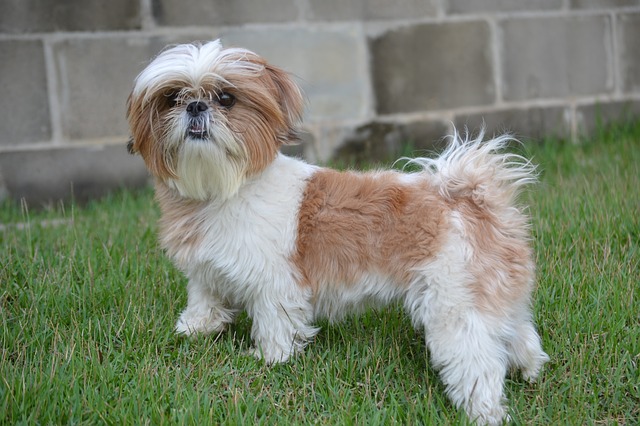
Shih Tzu dogs are a small breed of dog with a distinctive appearance.
They have a round head with a short, broad snout and a short, square jaw.
Just like pugs, most Shi Tzu dogs will snore or, at the very least, make some sort of noise in their sleep.
This is a result of the constricted airways due to their broad but short small snout.
If you are in luck, your Shi Tzu may make some hardly discernable noise.
But for the most part, your Shih Tzu will snore loud enough for you to notice it from the next room.
11. St. Bernard
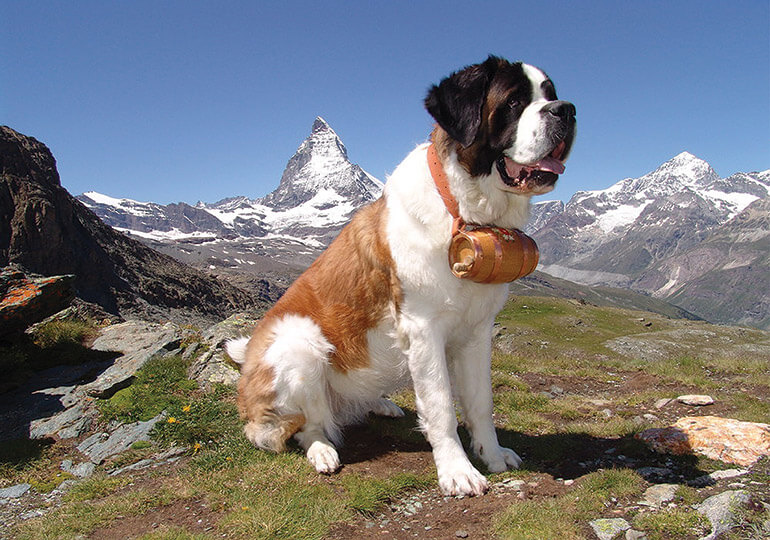
St. Bernards are not only known for their drooling or passing wind—they may also be loud snorers.
This is because St. Bernards are susceptible to laryngeal paralysis.
Laryngeal paralysis is a condition in which the muscles of the larynx (voice box) become paralyzed or weakened, causing difficulty breathing.
This condition is more commonly seen in older dogs, and it can be caused by various factors, including nerve damage, inflammation, or pressure on the laryngeal nerves.
Symptoms of laryngeal paralysis in dogs may include difficulty breathing, a hoarse or raspy bark, coughing, and exercise intolerance.
An affected dog will also snore loudly in their sleep.
12. Dogue de Bordeaux
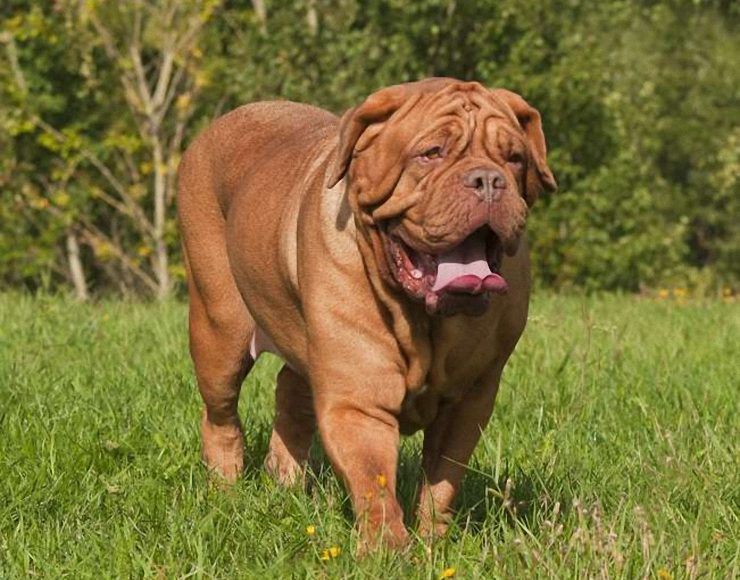
Dogue de Bordeaux, also known as French Mastiffs, are a large breed of dog with a short, wide head and a short, broad snout.
Their short snouts and large size can make them prone to breathing problems, particularly in hot weather or during periods of exercise.
Dogue de Bordeaux may also be more prone to respiratory infections and other conditions that can affect their breathing and thereby make them snore.
But sometimes, the snoring may not be due to any illness but just a result of their constricted airways due to their shortened snouts.
When to Be Concerned
While snoring can be considered to be normal in the dog breeds we have listed herein, it can also be concerning, particularly if not examined to establish whether or not there is a need for intervention or management.
Consider your dog’s snoring normal unless it is accompanied by other symptoms that may indicate serious health conditions:
- Snoring suddenly became louder
- Snoring is accompanied by coughing, sneezing, and changes in appetite
- Your dog has swollen facial areas
- Dog gasps for air or manifests open mouth breathing
- The dog has discharge from the eyes and nose
All these could be signs of more serious health issues in your pup and you should contact your vet immediately.
Related: Do Dogs Snore As They Get Older?
Snoring Dog Breeds: Parting Thoughts
For the most part, snoring is not a cause of concern in most dogs – especially if you have a brachycephalic breed.
But even the larger dogs may still snore if something blocks their airway or if they sleep on their backs.
So, if your dog starts snoring loudly, do not panic because it is normal.
All you need to do is to become accustomed to your canine friend’s sleep time sounds— sooner, they will be no different from a lullaby.
However, if your dog’s snoring is accompanied by other symptoms or seems to be causing them distress, then it could indicate an underlying health issue and that’s when you will want to consult a vet.
As an Amazon Associate, we may receive a small commission from qualifying purchases but at no extra cost to you. Learn more. Amazon and the Amazon logo are trademarks of Amazon.com, Inc, or its affiliates.

